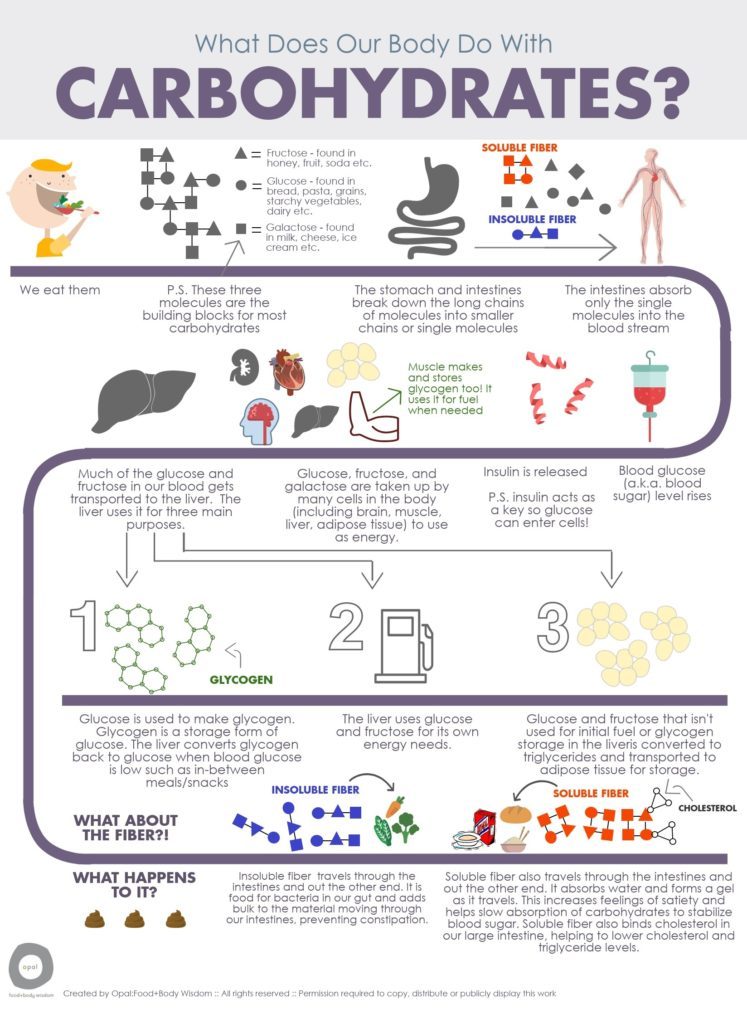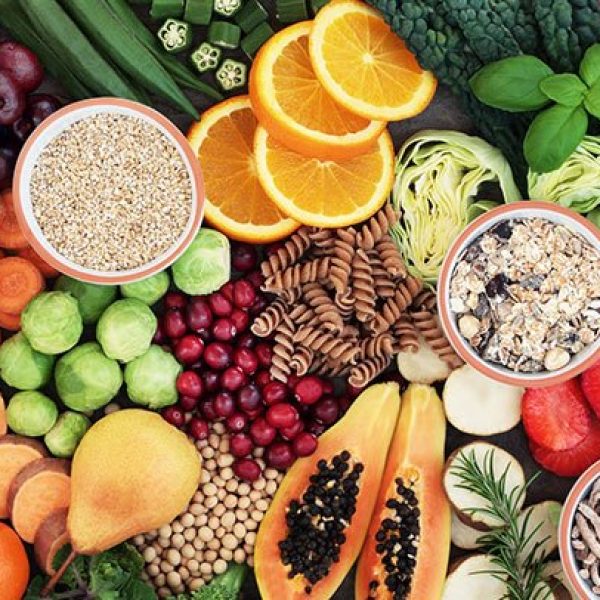I’m tired of hearing all of the nonsense about carbohydrates. “Eliminate carbs, carbs will make you fat, you don’t need carbs”…
I’m going to settle all this confusion with science backed facts so sit down and fasten your seat belt.
What are carbohydrates?
Carbohydrates are a macronutrient and the most important source of energy for your body. Without carbohydrates you would die.
Carbohydrates are made up of fiber, sugar and starches. Any particular food can contain any or all of these components. Broccoli, beans, corn, cookies, potato chips, cabbage and strawberries all contain carbohydrates. Foods rich in carbohydrates are important to a healthy diet because they provide energy to your body to move, think and just live.
How your body handles carbohydrates
This nifty infographic that shows how our bodies metabolize carbohydrates is from Opal Food + Body Wisdom:

If you’ve ever wondered why we call them carbohydrates, here’s why:
Carbohydrates have “Compounds of carbon, oxygen and hydrogen forming an important part of the diet and contributing mainly energy. They include sugars, starches and celluloses and are structurally classified into three groups—monosaccharides, disaccharides and polysaccharides. Starches and celluloses are polysaccharides.”
The Free Dictionary
High quality carbohydrates like whole grains, vegetables, fruits and beans provide vitamins, minerals, fiber and other important nutrients necessary for health. But low quality carbohydrates like foods made with refined grains and added sugars can be problematic when consumed in excess. The reason is that these low quality carbohydrates are low in nutrients and are rapidly digested and trigger blood sugar spikes and inflammation, among other issues.
Sure, potato chips, cookies, and hot dogs are chock-full of salt, sugar, fat, and calories. They can cause us to gain weight and put us at a higher risk of diseases such as diabetes and obesity. But why? What if there’s something unique about ultraprocessed foods that primes us to overeat and leads to bad health?
Julia Belluz, Vox
A new, intriguing hypothesis offers a potential answer. Increasingly, scientists think processed foods, with all their additives and sugar and lack of fiber, may be formulated in ways that disturb the gut microbiome, the trillions of diverse bacteria lining our intestines and colon. Those disturbances, in turn, may heighten the risk of chronic disease and encourage overeating.
Now before you go into moralizing mode, labeling carbohydrates “good” and “bad” let’s go a little deeper into how they affect us.
How carbohydrates became a health concern
If you consistently have an overall healthy diet, then eating low quality carbohydrates from time to time has little to no effect on your health. But what is an overall healthy diet? It varies from person to person but if you eat anywhere near the typical American diet it’s not considered healthy overall. It’s not because we are bad people and suck, but because of how our eating habits have evolved over time.
Back when people had no choice but to mostly eat foods prepared at home they at more vegetables, fruits, beans, and other real whole foods. But as more and more manufactured foods became available and lives became more hectic and in need of convenience there was a switch to a more low quality carbohydrate diet.
The US Government’s role in the carbohydrate confusion
Then, there’s the fact that the USDA had been promoting breads, cereals and grains as the base of the food pyramid for decades, which didn’t help matters. The USDA was not created to promote healthy eating. It was created to promote sales of agricultural products for farmers. Learn more about it here.
Let’s say you eat some cereal or a muffin or a breakfast sandwich along with some juice or sweetened coffee for breakfast; then turn around and eat a sandwich with chips or a burger with fries for lunch; an afternoon snack of a candy bar or a couple of cookies; and then for dinner you have some pasta, rice, tortillas, white potatoes or dinner rolls. You would have most of your diet from low quality carbohydrates that drive your blood sugar levels bonkers and possibly cause you to overeat due to the lack of fiber or protein to slow down your digestion.
If you ate like with any kind of regularity it would create a pretty significant imbalance of macronutrients. They typical American diet gets more than 50% of its calories from processed and ultraprocessed foods. Our bodies can’t operate at its optimal level with this imbalance. To maximize your health, energy and beauty you will need to correct this imbalance with high quality carbohydrates and also proteins and fats and maintain it long term.
Cuisines of the African Diaspora and healthy carbohydrates
Fortunately, most traditional cuisines are rich in the type of carbohydrates that would do your health a lot of good. Despite what people say, black people have been cooking and eating this way for centuries.
African, African American, Caribbean and Latin American people all traditionally grew a lot of their own food due to practical and economic circumstances. It wasn’t until fairly recently that we began eating larger proportions of manufactured foods. Revisiting our traditions and heritage is a great way to explore healthy eating and healthy carbohydrates that taste good and will nourish you and your family.

So, what does all of this mean!!??
- Carbohydrates are not bad things
- Carbohydrates include more than just cake and cookies, it’s also vegetables, fruits and beans
- Severely restricting carbohydrates is a bad idea
- Healthy eating requires greatly tipping the balance of your overall diet towards mostly whole fiber and micronutrient rich carbohydrate foods and away from highly refined food products
- An easy way to make choices about carbohydrates is to choose those that are higher in fiber.
So don’t go on a low carbohydrate diet to get healthy or to lose weight. A better strategy would be to eat a varied diet with lots of whole real unrefined foods, and make sure you’re getting lots of fiber from those carbohydrates you do eat. Don’t worry about eating junk from time to time. Focus your energies on increasing the amount of vegetables and fruits you eat every day.
How? Add creative salads to your meals, use vegetable purees as soup and sauce bases and reach for fruits and nuts for snacks.
Now, here’s something you won’t see written in other places. When you start switching from ultra processed carbs to vegetables and fruits, you may initially feel hungry and be tempted to give it up. For example, if you decided to add a side of fresh cucumber to your regular meal without eating more food, you will get hungry again soon.
Eating foods like fruits and vegetables that have a high percentage of water and most likely fewer calories means that you will likely need to eat more of them to be satisfied. This is not a bad thing. Don’t try to ration, just accept that eating until satisfaction will look a little different to you now.
Since this is not a diet there is no such thing as all-or-nothing thinking. This means you don’t have to wait, you can give eating healthier carbs a try today! Just do what you can. And let me know in the comments below how it works for you.


 I’m LifeBliss Lisa, Happiness Lifestyle Coach
I’m LifeBliss Lisa, Happiness Lifestyle Coach